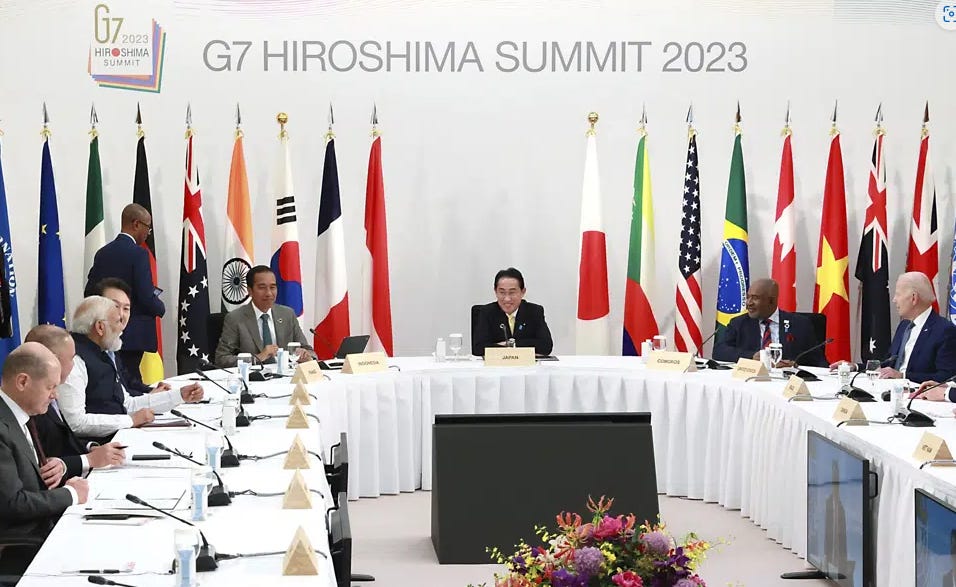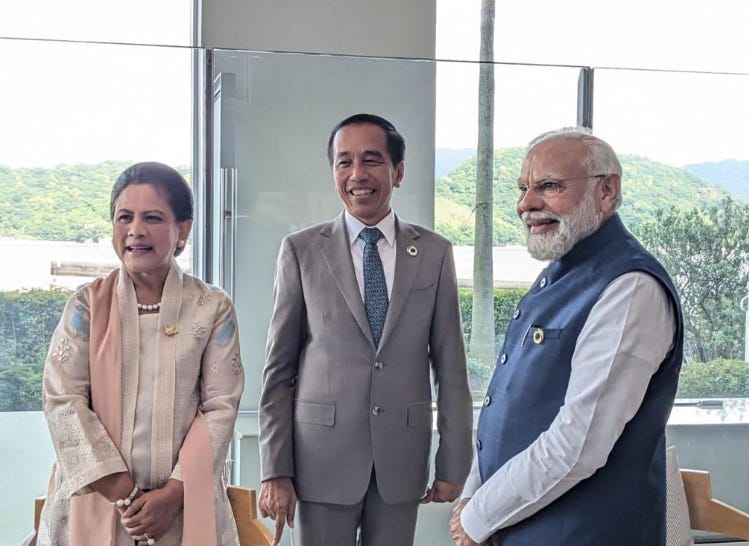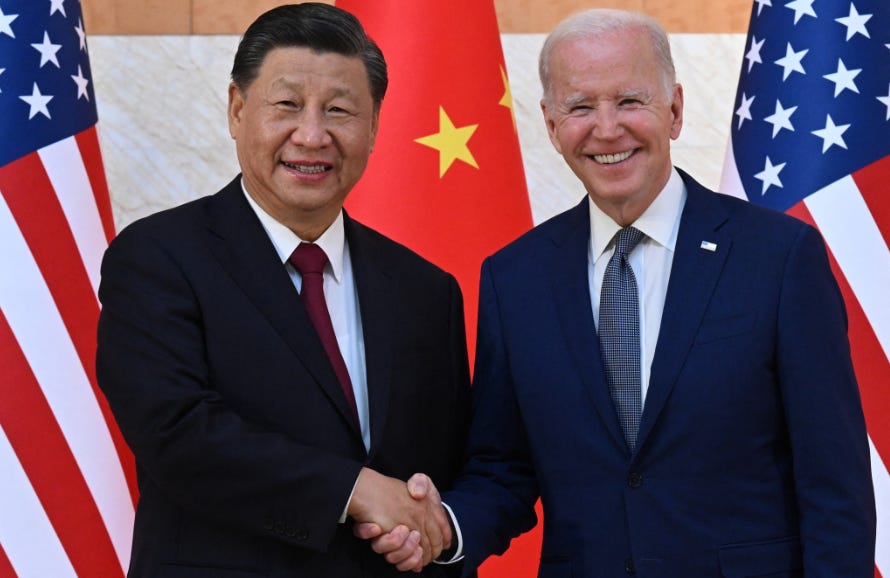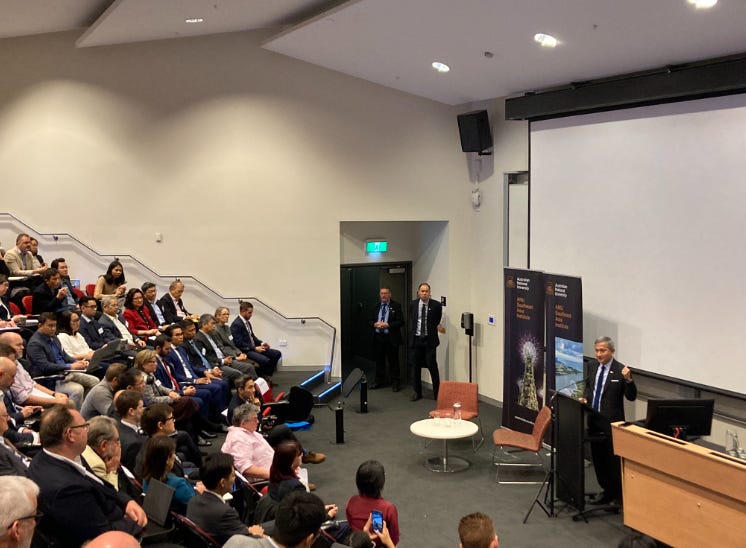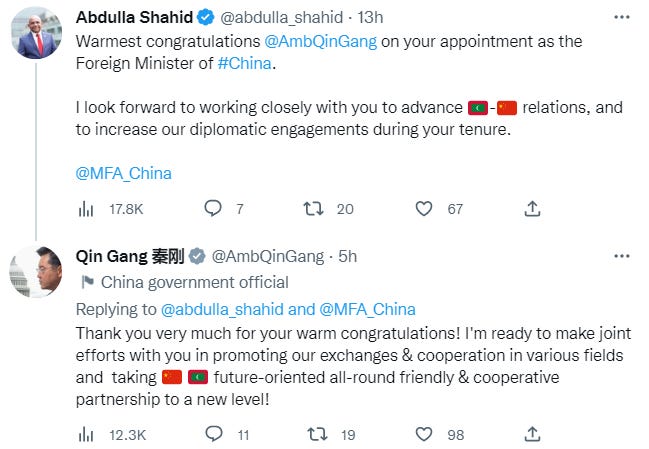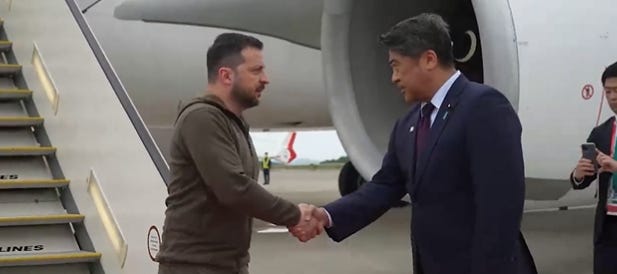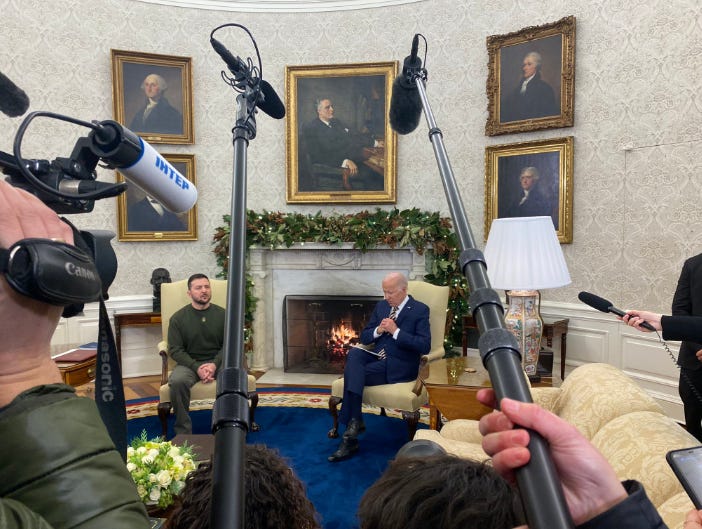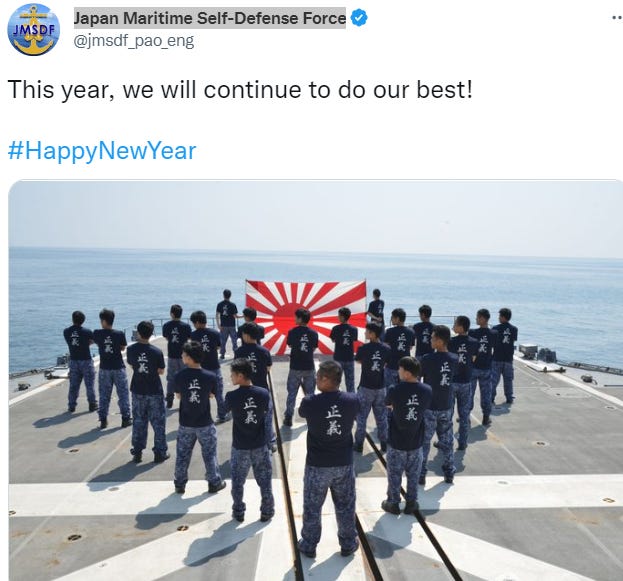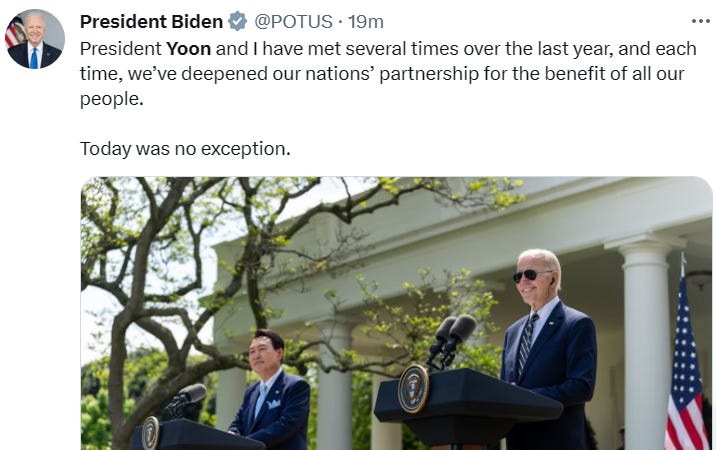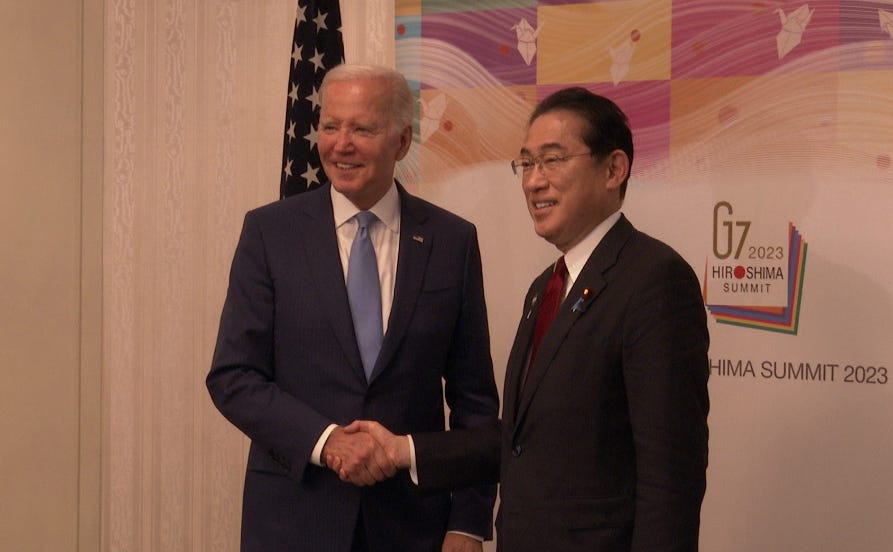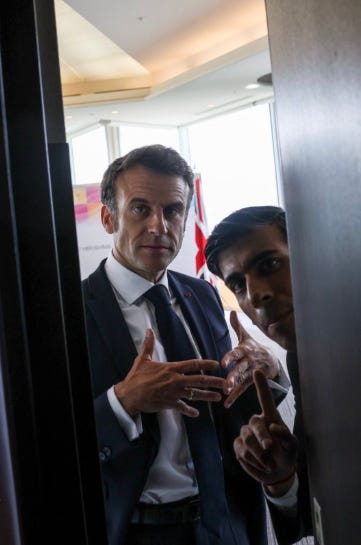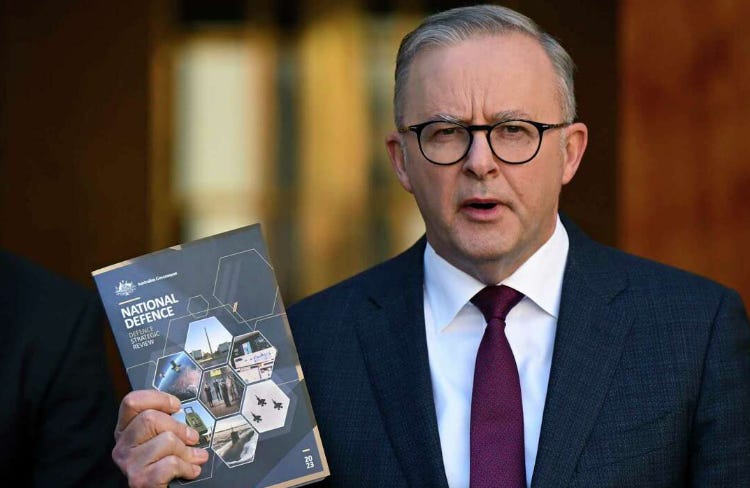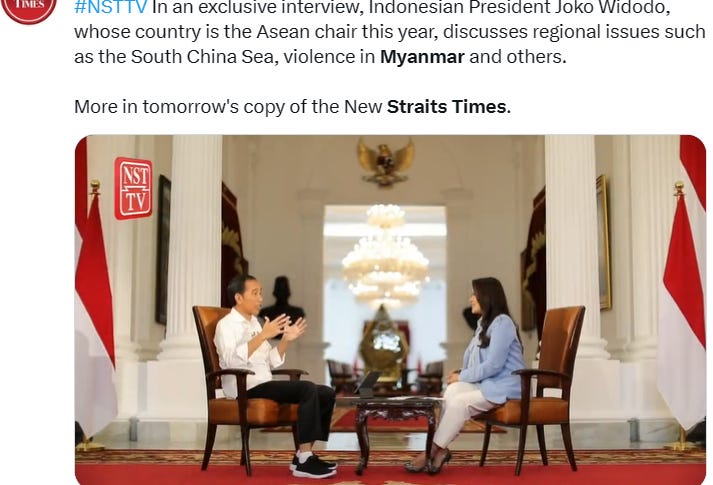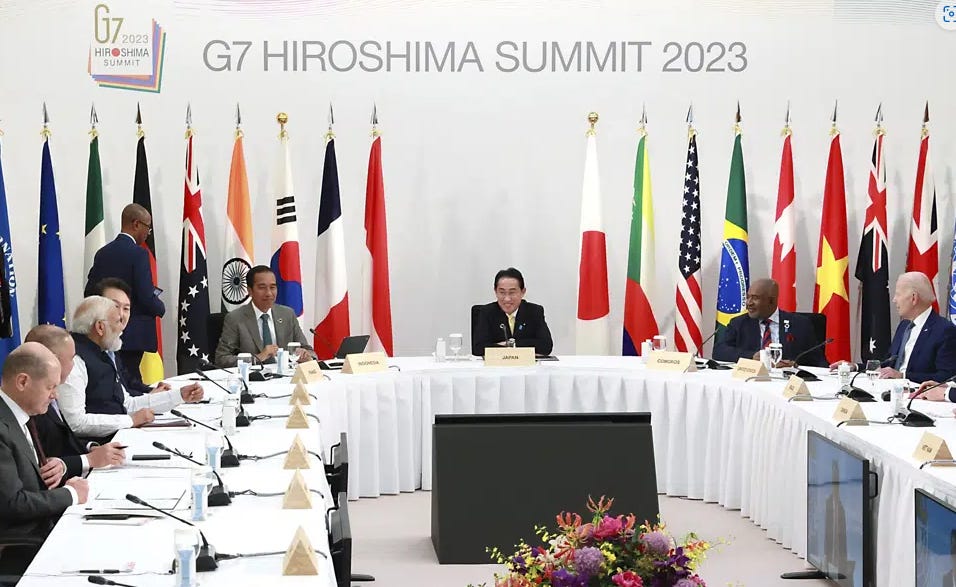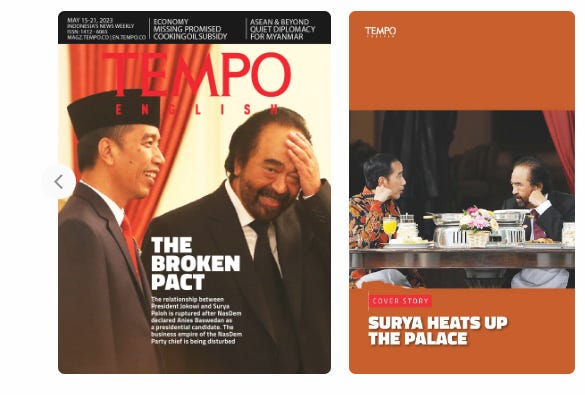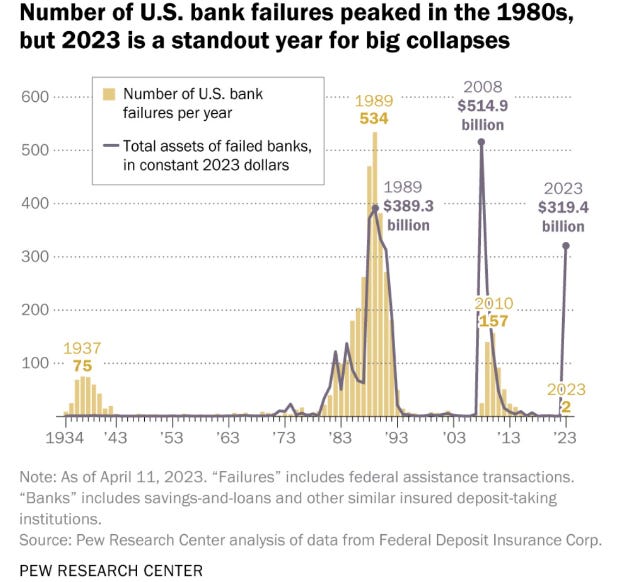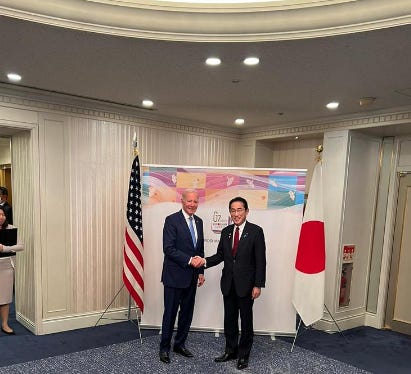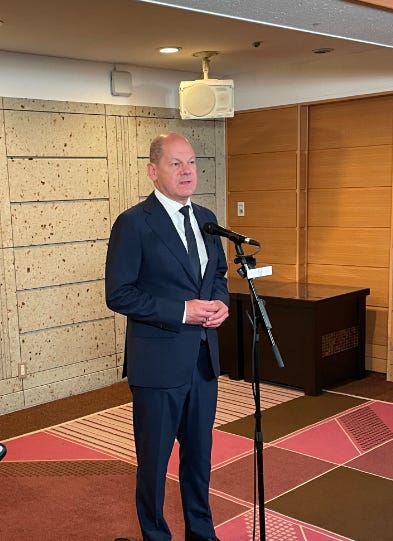G7 Hiroshima Leaders’ & G7 Guests Communiqué : Economy, Security, (Specific about) China, ASEAN, Indo Pacific
G7 and special guest leaders (this year special guests: Jokowi Indonesia, Brasil Lula, South Korea Yoon, Modi India) have released the highly anticipated statement on China issue and economic security. "We will address non-market policies and practices designed to reinforce dependencies and will counter economic coercion.
G20 2022 Chair Jokowi (Indonesia) meet G20 2023 Chair Narendra Modi (India)
(1) China issue:
"We stand prepared to build constructive and stable relations with China, recognizing the importance of engaging candidly with and expressing our concerns directly to China. We act in our national interest. It is necessary to cooperate with China, given its role in the international community and the size of its economy, on global challenges as well as areas of common interest."
"We call on China to engage with us, including in international fora, on areas such as the climate and biodiversity crisis and the conservation of natural resources in the framework of the Paris and Kunming-Montreal Agreements, addressing vulnerable countries’ debt sustainability and financing needs, global health and macroeconomic stability."
Our policy approaches are not designed to harm China nor do we seek to thwart China’s economic progress and development. A growing China that plays by international rules would be of global interest. We are not decoupling or turning inwards. At the same time, we recognize that economic resilience requires de-risking and diversifying. We will take steps, individually and collectively, to invest in our own economic vibrancy. We will reduce excessive dependencies in our critical supply chains."
With a view to enabling sustainable economic relations with China, and strengthening the international trading system, we will push for a level playing field for our workers and companies. We will seek to address the challenges posed by China’s non-market policies and practices, which distort the global economy. We will counter malign practices, such as illegitimate technology transfer or data disclosure.
We will foster resilience to economic coercion. We also recognize the necessity of protecting certain advanced technologies that could be used to threaten our national security without unduly limiting trade and investment. We remain seriously concerned about the situation in the East and South China Seas. We strongly oppose any unilateral attempts to change the status quo by force or coercion.
We reaffirm the importance of peace and stability across the Taiwan Strait as indispensable to security and prosperity in the international community.
There is no change in the basic positions of the G7 members on Taiwan, including stated one China policies. We call for a peaceful resolution of cross-Strait issues. We will keep voicing our concerns about the human rights situation in China, including in Tibet and Xinjiang where forced labor is of major concern to us. We call on China to honor its commitments under the Sino-British Joint Declaration and the Basic Law, which enshrine rights, freedoms and a high degree of autonomy for Hong Kong."
We call on China to act in accordance with its obligations under the Vienna Convention on Diplomatic Relations and the Vienna Convention on Consular relations, and not to conduct interference activities aimed at undermining the security and safety of our communities, the integrity of our democratic institutions and our economic prosperity." We call on China to press Russia to stop its military aggression, and immediately, completely and unconditionally withdraw its troops from Ukraine. We encourage China to support a comprehensive, just and lasting peace based on territorial integrity and the principles and purposes of the UN Charter, including through its direct dialogue with Ukraine."
Zelensky has been landed in Iwakuni Air Base, 37 miles from Hiroshima (3.07 pm local time / 2.07 am Washington DC)
There is no legal basis for China’s expansive maritime claims in the South China Sea, and we oppose China’s militarization activities in the region.
We emphasize the universal and unified character of the UNCLOS and reaffirm UNCLOS’s important role in setting out the legal framework that governs all activities in the oceans and the seas. We reiterate that the award rendered by the Arbitral Tribunal on July 12, 2016, is a significant milestone, which is legally binding upon the parties to those proceedings, and a useful basis for peacefully resolving disputes between the parties.
On North Korea: We strongly condemn North Korea’s unprecedented number of unlawful ballistic missile launches, each of which violated multiple UN Security Council Resolutions (UNSCRs).
We demand that North Korea refrain from any other destabilizing or escalatory actions, including any further nuclear tests or launches that use ballistic missile technology, which undermine regional stability and pose a grave threat to international peace and security. Such reckless actions must be met with a swift, united, and robust international response. This must include further significant measures to be taken by the UN Security Council.
We reiterate our unwavering commitment to the goal of North Korea’s complete, verifiable, and irreversible abandonment of its nuclear weapons and existing nuclear programs, and any other weapons of mass destruction (WMD) and ballistic missile programs in accordance with relevant UNSCRs.
We are concerned about North Korea’s choice to prioritize its unlawful WMD and ballistic missile programs over the welfare of the people in North Korea. We call on North Korea to accept repeated offers of dialogue, including from Japan, the United States, and the Republic of Korea. We urge North Korea to respect human rights, facilitate access for international humanitarian organizations, and resolve the abductions issue immediately.
On Indo-Pacific: "We reiterate the importance of a free and open Indo-Pacific, which is inclusive, prosperous, secure, based on the rule of law, and that protects shared principles including sovereignty, territorial integrity, peaceful resolution of disputes, and fundamental freedoms and human rights. Given the importance of the region, G7 members and our partners have taken respective Indo- Pacific initiatives to help strengthen our engagement. We underscore our commitment to strengthen coordination with regional partners, including the Association of Southeast Asian Nations (ASEAN) and its member states.
We reaffirm our unwavering support for ASEAN centrality and unity and our commitment to promoting cooperation in line with the ASEAN Outlook on the Indo-Pacific. We also reaffirm our partnership with Pacific Island countries and reiterate the importance of supporting their priorities and needs in accordance with the Pacific Islands Forum’s 2050 Strategy for the Blue Pacific Continent. We welcome and further encourage efforts made by the private sector, universities and think tanks, which contribute to realizing a free and open Indo- Pacific.
==========
(2) Economy, Security
We will continue to ensure that the clearly defined, narrow set of sensitive technologies that are crucial for national security or could threaten international peace and security are appropriately controlled, without unduly impacting broader trade in technology."
"We affirm that our cooperation to strengthen economic resilience and economic security will be rooted in maintaining and improving a well-functioning international rules-based system, in particular the multilateral trading system with the WTO at its core. To these ends, we will work and coordinate through the G7 framework to make year-on-year progress in a holistic manner."
"Under the Japanese G7 Presidency and against the background of early deployments of Open RAN, we will continue to exchange views on open architectures and security- related aspects and opportunities.
We support open, global, market-driven, and inclusive multi- stakeholder approaches for the development of technical standards for telecommunications equipment and services to enable openness and interoperability in a technology neutral way.
We discussed that such infrastructure requires a rigorous evaluation of equipment, consistent with existing measures such as those outlined in the Prague Proposals, and the EU’s 5G toolbox.
We reaffirm the need to assess political, economic, and other risks of a non-technical nature posed by vendors and suppliers. We will continue our work to build resilient critical infrastructure by sharing information and best practices gained through our respective efforts." "In light of increased use of non-market policies and practices to reinforce vulnerabilities, we reaffirm the need to make effective use of existing means while developing new tools as appropriate. We will continue to actively develop stronger international rules and norms to tackle non-market policies and practices that distort the level playing field, and strengthen efforts at the WTO to better address these issues."
"We will work together to ensure that attempts to weaponize economic dependencies by forcing G7 members and our partners including small economies to comply and conform will fail and face consequences. We express serious concern over economic coercion and call on all countries to refrain from its use, which not only undermines the functioning of and trust in the multilateral trading system, but also infringes upon the international order centered on respect for sovereignty and the rule of law, and ultimately undermines global security and stability. "
"At our respective domestic levels, we will use our existing tools, review their effectiveness and develop new ones as needed to deter and counter the use of coercive economic measures. Recognizing the importance of existing joint efforts including at the WTO, we will enhance collaboration by launching the Coordination Platform on Economic Coercion to increase our collective assessment, preparedness, deterrence and response to economic coercion, and further promote cooperation with partners beyond the G7.
Within this Coordination Platform, we will use early warning and rapid information sharing, regularly consult each other, collaboratively assess situations, explore coordinated responses, deter and, where appropriate, counter economic coercion, in accordance with our respective legal systems. We will also coordinate, as appropriate, to support targeted states, economies and entities as a demonstration of solidarity and resolve to uphold the rule of law."
"We will therefore deepen our strategic dialogue to seek to counter malicious practices in the digital sphere to protect global value and supply chains from illegitimate influence, espionage, illicit knowledge leakage, and sabotage. Cooperating on international standards setting: "Reflecting on shared values and principles, we will identify and address issues related to international standards setting, where they arise, through information sharing and engagement in the established standards setting processes.
We will deepen our cooperation through information sharing including with wider public and private stakeholders in international standards setting activities, and support effective standards setting. To this end, we reaffirm our continued collaboration including through the Framework for G7 Collaboration on Digital Technical Standards."
Protecting international peace and security by preventing leakage of critical and emerging technologies: "We will share, as appropriate, information and experiences to further develop common understanding of such risks and the policy tools needed to address them, and take further actions where necessary, including those related to export and investment, corresponding to the circumstances of each country." We will further strengthen multilateral efforts to cooperate in the field of export controls to ensure gaps in our dual use technology protection ecosystem cannot be exploited.
We have a common interest in preventing the narrow set of technological advances that are assessed to be core to enhancing the military and intelligence capabilities of actors who may use these capabilities to undermine international peace and security, from being fueled by our companies’ capital, expertise, and knowledge."
We recognize that appropriate measures designed to address risks from outbound investment could be important to complement existing tools of targeted controls on exports and inbound investments, which work together to protect our sensitive technologies from being used in ways that threaten international peace and security.
As we continue to work to make our economic security toolkits fit for today’s challenges, we will provide clarity to the private sector regarding these common goals. We will also continue to coordinate, share lessons, and seek to align our approaches where feasible to maximize the effectiveness of our efforts."
(Promoting to more engage in Substack) Seamless to listen to your favorite podcasts on Substack. You can buy a better headset to listen to a podcast here (GST DE352306207). Listeners on Apple Podcasts, Spotify, Overcast, or Pocket Casts simultaneously. podcasting can transform more of a conversation. Invite listeners to weigh in on episodes directly with you and with each other through discussion threads. At Substack, the process is to build with writers. Podcasts are an amazing feature of the Substack. I wish it had a feature to read the words we have written down without us having to do the speaking.




